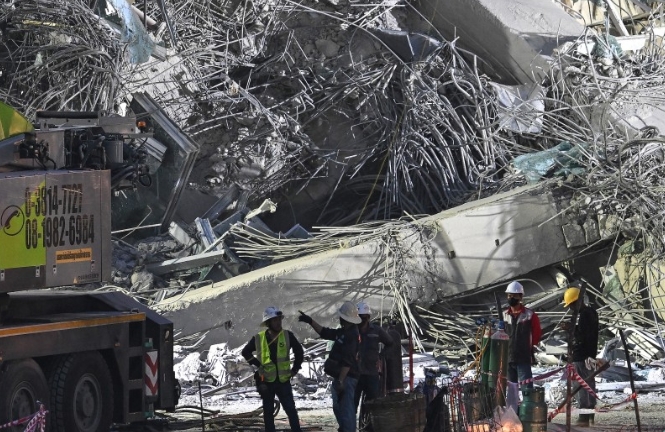Foreign
Senagal: I dissolved parliament to enable me deliver on my mandate-President Faye

Senegal’s President Bassirou Diomaye Faye on Thursday announced he had dissolved the opposition-dominated parliament and set new legislative elections for November 17.
“I have dissolved the National Assembly to ask the sovereign people for the institutional means that would allow me to give substance to the systemic transformation that I promised them,” Faye said on national television.
“Today, more than ever, the time has come to open a new phase in our term,” the 44-year-old head of state said.
Faye swept to a presidential victory in March 2024 on a promise of radical change for the West African nation.
Along with his Prime Minister Ousmane Sonko, Faye ran on a ticket of sovereignty and leftist pan-Africanism, raising the hopes of young people in a country where three-quarters of the population is under 35.
But government action has so far been hampered by the lack of a majority in parliament.
According to Senegal’s constitution, Faye could dissolve the opposition-dominated parliament from September 12 and call early legislative elections, which could give him the majority needed to implement his policy agenda.
In his address, Faye said “the pledge of a frank collaboration with the parliamentary majority.. was an illusion”.
“It has decided to turn its back on the people to pursue its cult of obstruction, thereby blocking the project for which I was elected,” he said.
He cited, in particular, the management of public finances under his predecessor Macky Sall, alleging “wilfully hidden excesses” of spending.
He added that a report approved by Senegal’s court of auditors would soon be published.
Foreign
Myanmar Quake Victim Rescued After 5 Days

Rescuers on Wednesday pulled a man alive from the rubble five days after Myanmar’s devastating earthquake, as calls grew for the junta to allow more aid in and halt attacks on rebels.
The shallow 7.7-magnitude earthquake on Friday flattened buildings across Myanmar, killing more than 2,700 people and making thousands more homeless.
Several leading armed groups fighting the government have suspended hostilities during the quake recovery, but junta chief Min Aung Hlaing said military operations would continue — despite international criticism of multiple reported air strikes.
UN agencies, rights groups and foreign governments have urged all sides in Myanmar’s civil war to stop fighting and focus on helping those affected by the quake, the biggest to hit the country in decades.
Hopes of finding more survivors are fading, but there was a moment of joy on Wednesday as a man was pulled alive from the ruins of a hotel in the capital Naypyidaw.
The 26-year-old hotel worker was extracted by a joint Myanmar-Turkish team shortly after midnight, the fire service and junta said.
Dazed and dusty but conscious, the man was pulled through a hole in the rubble and put on a stretcher, video posted on Facebook by the Myanmar Fire Services Department showed.
Call for peace
Min Aung Hlaing said Tuesday that the death toll had risen to 2,719, with more than 4,500 injured and 441 still missing.
But with patchy communication and infrastructure delaying efforts to gather information and deliver aid, the full scale of the disaster has yet to become clear, and the toll is likely to rise.
The World Health Organization (WHO) reported severe damage in the city of Sagaing, citing local rescuers saying one in three houses there have collapsed.
Healthcare facilities, damaged by the quake and with limited capacity, are “overwhelmed by a large number of patients”, while supplies of food, water and medicine are running low, WHO said in an update.
Sagaing has seen some of the heaviest fighting in Myanmar’s civil war, and AFP journalists have not been able to reach the area.
Relief groups say the overall quake response has been hindered by continued fighting between the junta and the complex patchwork of armed groups opposed to its rule, which began in a 2021 coup.
Julie Bishop, the UN special envoy on Myanmar, called on all sides to “focus their efforts on the protection of civilians, including aid workers, and the delivery of life-saving assistance”.
Even before Friday’s earthquake, 3.5 million people were displaced by the fighting, many of them at risk of hunger, according to the United Nations.
Late Tuesday, an alliance of three of Myanmar’s most powerful ethnic minority armed groups announced a one-month pause in hostilities to support humanitarian efforts in response to the quake.
The announcement by the Three Brotherhood Alliance followed a separate partial ceasefire called by the People’s Defence Force — civilian groups that took up arms after the coup to fight junta rule.
But there have been multiple reports of junta air strikes against rebel groups since the quake.
“We are aware that some ethnic armed groups are currently not engaged in combat, but are organising and training to carry out attacks,” said Min Aung Hlaing, mentioning sabotage against the electricity supply.
“Since such activities constitute attacks, the Tatmadaw (armed forces) will continue to carry out necessary defensive activities,” he said in a statement late Tuesday.
But the UN special rapporteur on human rights in Myanmar, Tom Andrews, rejected the junta’s characterisation of its operations.
“Senior General Min Aung Hlaing has described ongoing junta attacks in the midst of Myanmar’s suffering as ‘necessary protective measures’,” he wrote on X.
“They are neither necessary nor protective. They are outrageous and should be condemned in the strongest possible terms by world leaders.”
Rescue teams work to save residents trapped under the rubble of the destroyed Sky Villa Condominium development in Mandalay on March 29, 2025, a day after an earthquake struck central Myanmar. More than 90 people could be trapped inside the crushed remains of an apartment block in Mandalay in central Myanmar destroyed by a devastating earthquake, a Red Cross official told AFP on March 29 as rescuers worked to free the victims. (Photo by Sai Aung MAIN / AFP)
Thailand toll rises
Australia’s government decried the reported air strikes saying they “exacerbated the suffering of the people”.
“We condemn these acts and call on the military regime to immediately cease military operations and allow full humanitarian access to affected areas,” Foreign Minister Penny Wong said.
Amnesty International said “inhumane” military attacks were significantly complicating earthquake relief efforts in Myanmar.
“You cannot ask for aid with one hand and bomb with the other,” said the group’s Myanmar researcher Joe Freeman.
Hundreds of kilometres away, in the Thai capital Bangkok, workers continued to scour through the rubble of a collapsed 30-storey skyscraper.
The structure had been under construction when the earthquake hit and its crash buried dozens of builders — few of whom have come out alive.
The death toll at the site has risen to 22, with more than 70 still believed trapped in the rubble.
AFP
Foreign
Badenoch cautions UK to refrain from retaliating if Trump imposes tariffs

Kemi Badenoch has cautioned Britain against retaliating if Donald Trump imposes new tariffs on UK goods as part of his “liberation day” trade measures.
The Conservative leader stressed that import levies “just make everyone poorer” and urged Labour ministers to push for a “comprehensive” trade deal.
Despite efforts by Prime Minister Sir Keir Starmer and Business Secretary Jonathan Reynolds to secure an exemption, UK goods are expected to be hit alongside other global imports.
Badenoch emphasised the need for a deal covering key industries like manufacturing, particularly steel and automotive, warning that tariffs would “severely cripple” these sectors.
“Some people will want us to have trade retaliation, that just makes everyone poorer,” she told LBC. “This is a time for significant diplomacy… the people who will suffer aren’t just our exporters but also the American consumer.”
She dismissed suggestions that the UK should distance itself from the US due to Trump’s policies, stating,
“My view is that we need to stick closely to the US, they are an ally.
“We do not want a world where Nato is fragmented, that is very bad for our national security.
“We need to do what is in our national interest; where we disagree we should say so and I don’t mind people saying where they disagree.
“But I do have a problem with people just criticising for the sake of it when they actually haven’t got a concrete example of what it is that they are talking about in terms of policy. They are expressing their personal views about an individual.
“I haven’t banned anyone from doing so but I don’t think it is right because … having people from another country endlessly criticise your government in the open is not helpful.”
Trump has already announced a 25% import tax on foreign cars, dealing a major blow to the UK auto industry, which exported over 101,000 units worth £7.6 billion to the US last year.
Additionally, new tariffs—potentially including a 20% tax—are set to take effect on April 2, targeting UK products in response to VAT rules Trump views as unfair.
These levies could disrupt the UK’s economic plans, coming shortly after Chancellor Rachel Reeves’ budget cuts aimed at stabilizing public finances.
Foreign
Journalists rally against White House’s decision to modify allocation of seats in briefing room

The White House said Monday it is “seriously considering” taking control of deciding which journalists get seats in the famed briefing room, in the latest bid by President Donald Trump’s administration to exert power over the media.
The 49 spots in the press room, where spokespeople, officials and occasionally the president take the podium, have long been allocated by the non-partisan group of independent journalists, the White House Correspondents Association.
White House Press Secretary Karoline Leavitt accused the WHCA of trying to maintain a “monetized monopoly over the briefing room.”
“As for switching up seating in the briefing room, it’s something we are seriously considering,” she told Fox News.
“The briefing room is part of the People’s House, it belongs to the American people. It does not belong to elitist journalists here in Washington DC.”
News outlet Axios reported earlier that the White House wanted to take control of the seating chart to give more prime front-of-room spots to new media, and move some legacy outlets further back.
The WHCA, of which AFP is a member, opposed the “wrong-headed” move.
“The reason the White House wants control of the briefing room is the same reason they took control of the pool: to exert pressure on journalists over coverage they disagree with,” WHCA President Eugene Daniels said in a statement.
The WHCA and the White House both said they had tried to broker a meeting on the issue.
It is the latest effort by the White House to shape who covers Trump after taking control from the WHCA in February of the “pool” that covers the president in the Oval Office and when he travels on Air Force One.
The White House has added access to the pool for new and in several cases openly pro-Trump media, while reducing access to mainstream organisations.
It also continues to bar the Associated Press news agency from almost all presidential events as it refuses to refer to the Gulf of Mexico as the “Gulf of America,” the name newly decreed by Trump.
AFP
-

 News10 hours ago
News10 hours agoNatasha: Kogi PDP hammers Ododo, reiterates unfeigned support for her
-

 Economy9 hours ago
Economy9 hours agoSEE Black Market Dollar To Naira Exchange Rate Today 3rd April 2025
-

 News16 hours ago
News16 hours agoRivers APC demands Fubara’s probe over ex-HoS allegations
-

 News5 hours ago
News5 hours agoJust in: “Ignore rumour mongers, there was no time I collapsed “-Wike asserts
-

 News5 hours ago
News5 hours agoCJ transfers Natasha’s case to Justice Nyako
-

 News8 hours ago
News8 hours agoJust in: INEC dumps recall petition against Sen Natasha
-

 Economy17 hours ago
Economy17 hours agoNaira rebounces against the dollar in parallel market
-

 News12 hours ago
News12 hours agoJust in: Finally, Trump imposes 14% tarriff on Nigeria oil, others





